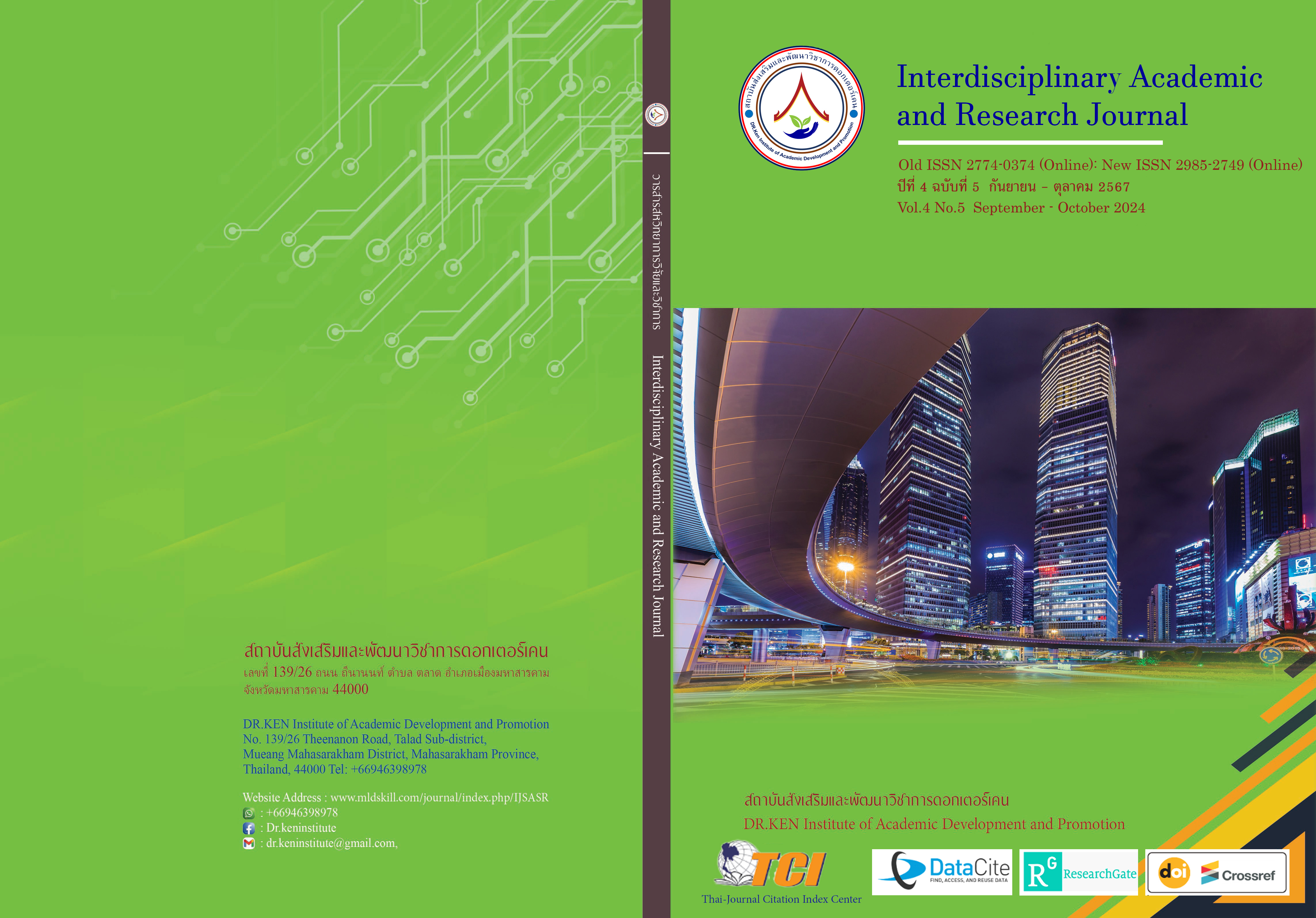Lower Secondary Student Characteristics Development Model According to the Royal Policy on Education of Educational Institutions under the Secondary Educational Service Area Office Maha Sarakham
DOI:
https://doi.org/10.60027/iarj.2024.277433Keywords:
Royal Policy on Education; , Model Development; , Student CharacteristicsAbstract
Background and Aims: The students who follow the lower secondary level of the Royal Policy on Education are responsible, flexible, and well-rounded due to the comprehensive approach taken in teaching. This all-encompassing growth is necessary to achieve personal fulfillment and to promote a progressive, enlightened society. This paper aims to (1) study elements, indicators, and approaches to develop lower secondary student characteristics according to the royal policy on education of educational institutions, (2) create a lower secondary student characteristics development model according to the royal policy on education for educational, (3) study outcome of implementation of the created lower secondary student characteristics development model according to the royal policy on education, And (4) evaluate the implemented lower secondary student characteristics development model. This research was hold in the area of Secondary Educational Service Area Office Maha Sarakham.
Methodology: The research was conducted according to the determined research and development process, which was divided into 4 stages. The equipment used in analyzing the collected quantitative and qualitative data in this research were 5-point rating scale surveys, 5-point rating scale evaluation forms, and scoring rubrics forms. Percentage, mean, and standard deviation were used as the research statistics.
Results: It was found that the lower secondary student characteristics according to the royal policy on education of educational institutions under the Secondary Educational Service Area Office Maha Sarakham: 1) The Right Attitude Towards the Country with 4 indictors—1.1) Be knowledgeable and understanding of the Nation, 1.2) Adherence to religion, 1.3) Be loyalty to the Monarchy, and 1.4) Be generous to own family and community, 2) Stability and Morality of Life Foundation with 4 sub-indicators—2.1) Be able to tell good from bad, 2.2) Behave well and properly, 2.3) Refuse to participate in any wrong or sinful actions, and 2.4) Encourage good people in nation, 3) Employability and Career with 3 sub-indicators—3.1) Raise your children or train them to love working and being earnest to succeed, 3.2) Practice both inside and outside the class emphasizing on teamwork and career success, and 3.3) Support new graduates with career opportunities so that they could provide for self and family, and 4) Good Citizenship with 3 sub-indicators—4.1) Being a good citizen is everybody’s responsibility, 4.2) Family, educational institutions, and workplace shall give everyone opportunity to become a good citizen , and 4.3) A good citizen means “never hesitate to be helpful for the nation,” such as helping with volunteer work, community service, and charity with kindness and generosity.
Conclusion: Four main areas are prioritized in Maha Sarakham's Royal Policy on Education for Lower Secondary Students: developing a proper national attitude, maintaining stability and morality, advancing employability and career readiness, and promoting good citizenship. These qualities are intended to foster the development of intelligent, moral, diligent, and community-minded people.
References
กระทรวงศึกษาธิการ. (2563). แนวทางการวัดและประเมินผลในชั้นเรียนกลุ่มสาระการเรียนรู้วิทยาศาสตร์ตามหลักสูตรการศึกษาขั้นพื้นฐานพุทธศักราช 2544. กรุงเทพฯ: คุรุสภาลาดพร้าว.
ดาวพงษ์ รัตนสุวรรณ. (2563). พลเอก ดาว์พงษ์ รัตนสุวรรณ องคมนตรี ตรวจเยี่ยมและติดตามการดำเนินงานตามยุทธศาสตร์มหาวิทยาลัยราชภัฏยะลา เพื่อการพัฒนาท้องถิ่น ประจำปี 2563. Retrieved from: https://www.isoc5.net/presses/view/186/
นพดล เด่นดวง. (2560). การประเมินโครงการตามแนวทางเบญจวิถีเพื่อเสริมสร้างคุณลักษณะความเป็นสุภาพบุรุษสุภาพสตรีของนักเรียนโรงเรียนกาญจนาภิเษกวิทยาลัย นครปฐม (พระตำหนักสวนกุหลาบมัธยม). นครปฐม: โรงเรียนกาญจนาภิเษกวิทยาลัย นครปฐม.
นวภา วงษ์อินตา (2564) ผลการจัดการเรียนรู้ด้วยชุดสร้างความรู้ในรายวิชาการจัดการเรียนรู้คณิตศาสตร์ สำหรับครูประถมศึกษา ตามแนวทฤษฎีคอนสตรัคติวิสต์. วารสารวิชาการและวิจัย มหาวิทยาลัยภาคตะวันออกเฉียงเหนือ, 13 (3), 173-187.
บุญชม ศรีสะอาด. (2546). การวิจัยเบื้องต้น. กรุงเทพฯ: สำนักพิมพ์ชมรมเด็ก.
ประไพรัตน์ ลำใจ. (2557). รูปแบบการพัฒนาคุณธรรม จริยธรรมนักเรียนระดับมัธยมศึกษา. วิทยานิพนธ์ปริญญาดุษฎีบัณฑิต: มหาวิทยาลัยพะเยา.
ปาริชาติ ธีระวิทย์. (2561). การเสริมสร้างคุณธรรมจริยธรรมสำหรับนักศึกษาระดับบอดุมศึกษาในศตวรรษที่ 21. วารสารเทคโนโลยีภาคใต้ , 11 (11), 31-39.
ไพศาล วรคํา. (2559). การวิจัยทางการศึกษา. มหาสารคาม: ตักสิลาการพิมพ์.
เยาวดีรางชัยกุล วิบูลย ศรี . (2546). การประเมินโครงการแนวคิดและแนวปฏิบัติ. กรุงเทพฯ: จุฬาลงกรณมหาวิทยาลัย.
รัตนะ บัวสนธ์. (2554). การวิจัยและพัฒนานวัตกรรมการศึกษา. (พิมพ์ครั้งที่ 2). นครสวรรค์: ริมปิงการ.
วาโร เพ็งสวัสดิ์. (2552). วิธีวิทยาการวิจัย. กรุงเทพฯ: สุวีริยาสาส์น.
วิชัย วงษ์ใหญ่. (2554). นวัตกรรมหลักสูตรและการเรียนรู้สู่ความเป็นพลเมือง. กรุงเทพฯ : บริษัท อาร์ แอนด์ ปริ้นท์ จํากัด.
สำนักการบริหารมัธยมศึกษาตอนปลาย. (2562). แผนพัฒนาคุณภาพการศึกษาระยะ 3 ปี (ปีการศึกษา 2564 – 2566). สำนักการบริหารมัธยมศึกษาตอนปลาย.
สำนักงานคณะกรรมการการศึกษาขั้นพื้นฐาน. (2564). น้อมนำพระบรมราโชบายด้านการศึกษา สู่การปฏิบัติและปลุกจิตสำนึกความรักชาติ ศาสนาและเทิดทูนพระมหากษัตริย์. Retrieved from: https://www.moe.go.th/น้อมนำพระบรมราโชบายด้า/
สำนักงานคณะกรรมการการอาชีวศึกษา. (2564).แนวทางการน้อมนำพระบรมราโชบาย ด้านการศึกษาสู่การปฏิบัติในสถานศึกษา. สำนักงานคณะกรรมการการอาชีวศึกษา.
สำนักงานเลขาธิการสภาการศึกษา. (2559). แผนการศึกษาแห่งชาติ พ.ศ. 2560 – 2579. กรุงเทพฯ: พริกหวานกราฟฟิค.
สำนักงานสภาพัฒนาการเมือง สถาบันพระปกเกล้า. (2558). คุณธรรมและจริยธรรมไม่มีขายสังคมไทยจะมีได้ต้องช่วยกัน. กรุงเทพฯ: สำนักพิมพ์คณะรัฐมนตรีและราชกิจจานุเษกษา.
สำนักปลัดกระทรวงศึกษาธิการ. (2563).แนวทางการดำเนินงานโครงการสร้างและส่งเสริมความเป็นพลเมืองดี ตามรอยพระยุคลบาทด้านการศึกษาสู่การปฏิบัติ ประจำปี 2563. สำนักปลัดกระทรวงศึกษาธิการ.
สิริวรรณ ศรีพหล. (2559). ชุดฝึกอบรมทางไกล เรื่อง การจัดกิจกรรมการเรียนรู้เพื่อส่งเสริมสำนึกความรักชาติให้เกิด 250 แก่นักเรียนโดยใช้เนื้อหาและแหล่งวิทยาการทางประวัติศาสตร์สำหรับครูสังคมศึกษา. นนทบุรี: มหาวิทยาลัยสุโขทัยธรรมาธิราช.
สุทธิวรรณ ตันติรจนาวงศ์ และศศิกาญจน์ ทวิสุวรรณ. (2552). การส่งเสริมคุณธรรมจริยธรรมที่มีประสิทธิภาพ:กรณีศึกษากลุ่มเด็ก/เยาวชนและช้าราชการภาครัฐ. กรุงเทพฯ: กรมการศาสนา กระทรวงวัฒนธรรม.
สุระ อ่อนแพง, ปัญญา สังขวดี, วิทยา จันทร์ศิลา, สำราญ มีแจ้ง. (2556). รูปแบบการบริหารเพื่อพัฒนาคุณธรรมจริยธรรมนักเรียนระดับประถมศึกษาในสถานศึกษาสังกัดสำนักงานเขตพื้นที่การศึกษาประถมศึกษา. วารสารศึกษาศาสตร์มหาวิทยาลัยนเรศวร, 15, (5), 258-265.
Abowitz, K. K., & Harnish, J. (2006). Contemporary Discourses of Citizenship. Review of Educational Research, 76(4), 653-690. https://doi.org/10.3102/00346543076004653
Buell, E.K. (2009). The relationship of ethics education to the moral development of accounting students (D.B.A.). Ann Arbor: United States. Retrieved from https://search.proquest.com/pqdtglobal/docview/305149926 /abstract/4F472A17222C449CPQ/9
Dahl, A., Killen, M. (2018). A Developmental Perspective on the Origins of Morality in Infancy and Early Childhood. Front Psychol. 20 (9), 1736. doi: 10.3389/fpsyg.2018.01736.
Fitzgerald, D. (2011). The relationship between high school leadership organizations and moral growth (Ed.D.). United States: Ann Arbor.
Ministry of Education. (2020). Royal Policy on Education under King Rama X. Retrieved from Ministry of Education, Thailand.
Office of the Basic Education Commission. (2021). Guidelines for Implementing Royal Education Policy. Retrieved from OBEC.
UNESCO Bangkok. (2021). Education in Thailand: An OECD-UNESCO Perspective. Retrieved from UNESCO Bangkok.
Downloads
Published
How to Cite
Issue
Section
License
Copyright (c) 2024 Interdisciplinary Academic and Research Journal

This work is licensed under a Creative Commons Attribution-NonCommercial-NoDerivatives 4.0 International License.
Copyright on any article in the Interdisciplinary Academic and Research Journal is retained by the author(s) under the under the Creative Commons Attribution-NonCommercial-NoDerivatives 4.0 International License. Permission to use text, content, images, etc. of publication. Any user to read, download, copy, distribute, print, search, or link to the full texts of articles, crawl them for indexing, pass them as data to software, or use them for any other lawful purpose. But do not use it for commercial use or with the intent to benefit any business.
















.png)


